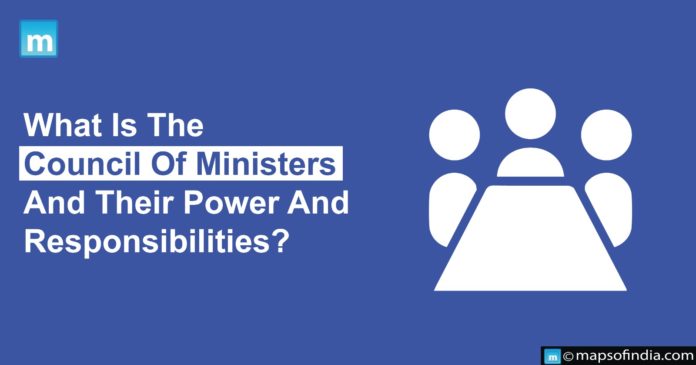The Council of Ministers is an integral part of the government of India. It is responsible for assisting and advising the President in exercising their dutiesThe Council of Ministers is headed by the Prime Minister, who the President appoints.
Types of Council of Ministers
-
Cabinet Ministers
The Cabinet Ministers are the senior-most members of the Council of Ministers. They are responsible for making major policy decisions and are in charge of essential ministries like Home Affairs, Finance, Defence, External Affairs, etc.
-
Ministers of State
Ministers of State are junior members of the Council of Ministers. They are appointed to assist Cabinet Ministers and are responsible for specific areas of their assigned ministry.
-
Deputy Ministers
They work alongside cabinet ministers or ministers of state to help them with organizational, administrative, and parliamentary responsibilities.
Functions of the COMs
-
Formulating Policies
The Council of Ministers’ primary function is to formulate government policies. The Cabinet Ministers are crucial in this regard, responsible for making major policy decisions.
-
Implementing Policies
Once policies have been formulated, it is the responsibility of the Council of Ministers to ensure that they are implemented effectively. The Ministers of State play a vital role in this regard, as they are responsible for implementing policies in their respective areas.
-
Advising the President
The Council of Ministers advises the President on the country’s governance matters. The Prime Minister is the chief advisor to the President and is responsible for ensuring that the Council of Ministers provides the necessary advice and guidance.
-
Allocating Resources
The Council of Ministers allocates resources for various government programs and projects. This is done through the budgetary process, which the Finance Minister oversees.
-
Legislative Functions
The Council of Ministers plays a crucial role in the legislative process. Cabinet Ministers are responsible for introducing bills in Parliament and ensuring their passage through both houses. Ministers of State also participate in the legislative process by participating in debates and voting on bills.
-
Foreign Policy
The COMs are responsible for formulating and implementing India’s foreign policy. The External Affairs Minister is key in this regard, as they are responsible for India’s relations with other countries.
-
Administrative Functions
The COMs are responsible for the overall administration of the government. This includes the appointment of senior officials, the management of government-owned companies, and the regulation of various industries.
Responsibilities of COMs
-
Collective Responsibility
According to Article 75 of the Indian Constitution, the COM is collectively liable to the lower house of the Indian Parliament. This indicates that all ministers are jointly liable before the Lok Sabha for all acts of negligence and conduct.
-
Individual Responsibility
Article 75 also includes the notion of personal responsibility. It stipulates that ministers serve at the leisure of the President, which implies that the President can dismiss a minister even if the Minister has the support of the Lok Sabha. Nonetheless, the President may only dismiss a minister on the Prime Minister’s suggestion.




